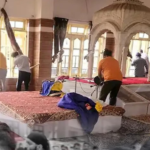An unbroken thread links India’s 21‑year struggle against cross‑border terrorism, from the 2001 Parliament attack to the 2016 “surgical strikes” and the 2019 Balakot air strikes, into the present moment. On 22 April 2025 five Lashkar‑e‑Taiba gunmen slaughtered twenty‑six mostly Hindu tourists at Baisaran meadow near Pahalgam, Anantnag district, after segregating the victims by religion.[1] Within twenty‑four hours New Delhi’s Cabinet Committee on Security (CCS) validated “cross‑border linkages,” suspended the Indus Waters Treaty and ordered a graduated response “to bring the perpetrators and their sponsors to justice.”[2] Economic and diplomatic screws turned first: a blanket ban on Pakistani imports (2 May)[3] and reciprocal port closures (4 May)[4] reduced bilateral trade to zero and shrank the two High Commissions to skeletal staffs. Yet Pakistan army mortar fire persisted across the Line of Control, and Indian intelligence traced the Pahalgam cell to Lashkar training clusters in Pakistan and Pakistan‑occupied Jammy and Kashmir (PoJK). With public outrage mounting, the government authorised a justified calibrated kinetic strike, Operation Sindoor.



